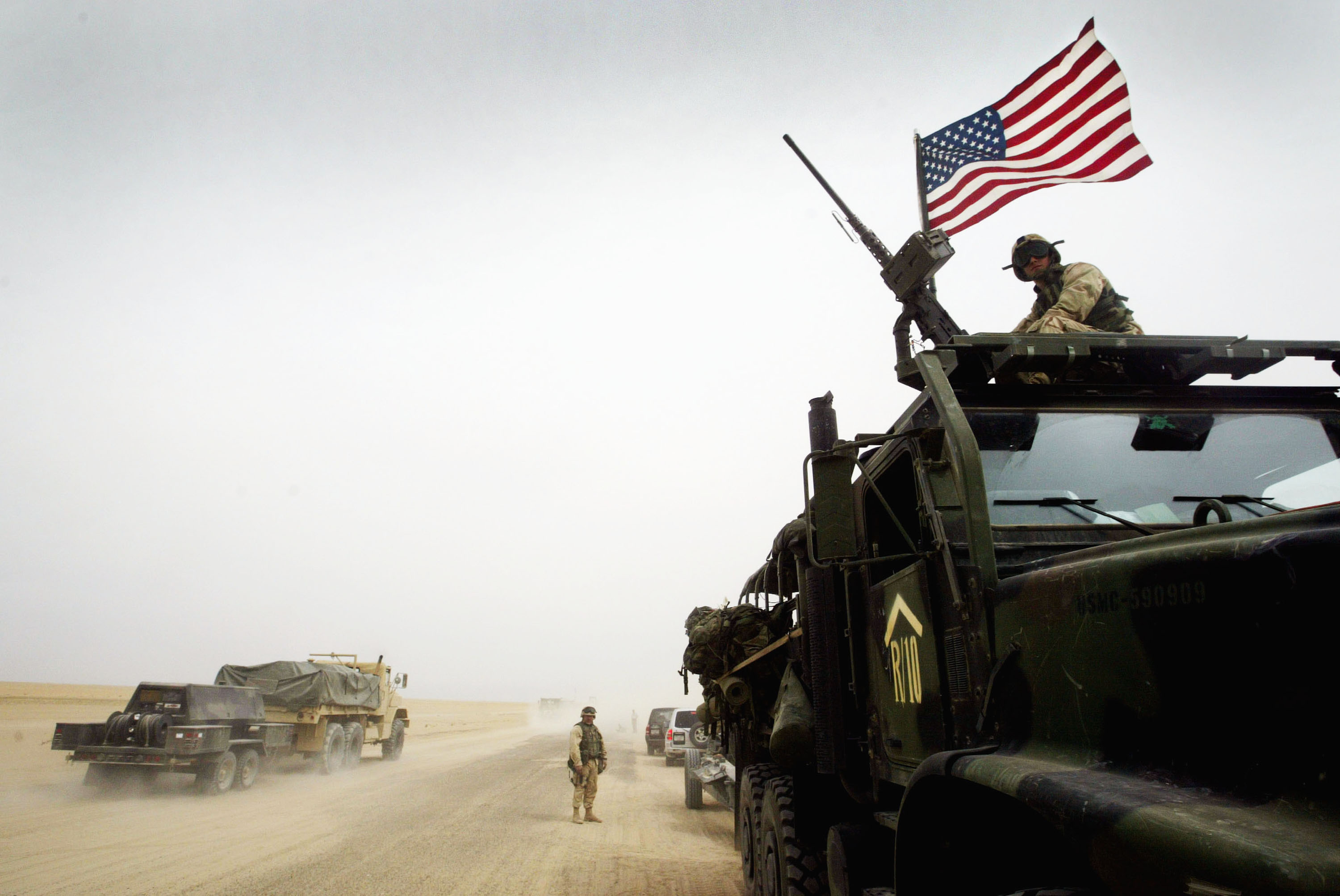America sows chaos
How did the U.S. become a revisionist power?


Is America a force for order in the world today? Or for chaos?
The question is prompted by President Trump's reaction to the apparent use of chemical weapons by the Syrian government in that country's long-running civil war. Trump is not the only Western leader considering taking military action; the French president, Emmanuel Macron, is actually leading the charge. Even though both men previously criticized hawks who favored intervening to depose Syrian President Bashar al-Assad, both are now contemplating the use of force to uphold the international norm against the use of chemical weapons.
Phrased that way, it sounds like if America does launch missiles or send troops, we'll be acting as a force for order, upholding international law and deterring other bad actors from using these kinds of barbaric weapons. But the veneer of this justification is paper-thin. Neither America nor France has any kind of warrant under international law to fire missiles whenever we believe some malefactor has committed a war crime, and it is blindingly obvious that no such warrant could possibly be generalized to the international community as a whole.
The Week
Escape your echo chamber. Get the facts behind the news, plus analysis from multiple perspectives.

Sign up for The Week's Free Newsletters
From our morning news briefing to a weekly Good News Newsletter, get the best of The Week delivered directly to your inbox.
From our morning news briefing to a weekly Good News Newsletter, get the best of The Week delivered directly to your inbox.
But if it is a veneer of justification, what on Earth is it covering? Why would we be looking for excuses to get more deeply involved in Syria?
A country as large and powerful as the United States, which played a formative role in the construction of so many multinational institutions, and with so many benefits to gain from international trade, should logically be a conservative, status-quo power. From that perspective, our most important goals should be preventing any serious rival from developing both the means and the motive to challenge our position, and preserving international order generally. Would either goal be furthered by intervention in Syria? It's hard to see how.
America's most potent rival, China, views American intervention in the Middle East as a welcome distraction from the western Pacific and a drain on our national resources. Russia and Iran each have a real stake in the outcome in Syria, but both countries are trying to preserve a pre-existing position in the country through their relationships with the Assad regime, rather than to expand and threaten American interests. We could be pleased that they have to waste resources on such an effort without putting our own credibility on the line to prevent their success.
As for preserving order, or protecting the interests of our major European allies, the greatest threat to these is the Syrian civil war itself, and the refugee crisis and metastasis of Sunni extremism it has spawned. If America were behaving as a status-quo power, then from the beginning our paramount goal would have been to end the Syrian civil war as quickly as possible on pretty much whatever terms could be achieved and, failing that, to quarantine that conflict so as not to draw in Saudi, Iranian, Turkish, and Russian intervention.
A free daily email with the biggest news stories of the day – and the best features from TheWeek.com
But America has not been acting as a status-quo power for some time. Rather, we have been behaving, increasingly, like a revisionist power, dissatisfied with the arrangements that obtain internationally, and seeking to overturn them, by force if necessary.
How did that come to pass? It's tempting to blame the 9/11 attacks for convincing Americans that the status quo was simply insufficiently secure, that if we didn't take action to remake the world, or at least the Middle East, our passivity and reactiveness would lead to even greater horrors. This argument was certainly made very forcefully by both hawkish neoconservative idealists like Deputy Secretary of Defense Paul Wolfowitz and brutal realists like Vice President Dick Cheney.
But the intellectual foundations for such a viewpoint predate 9/11, and America had been behaving like a revisionist power for years prior to the attacks. While the Gulf War was a classic status-quo power engagement, undertaken to reverse Saddam Hussein's aggressive invasion of neighboring Kuwait and restore the status-quo ante, America did not, after the war, pursue a policy aimed at restoring peace. Rather, we pursued a policy of isolation and harassment aimed at weakening the Hussein regime in the hopes that it would topple of its own accord. The Iraq War was a dramatic escalation of a conflict that was ongoing, and driven by the American determination to remake the region.
Nor was Iraq the only arena where American policy was expansive and expansionist. After the collapse of the Soviet Union, America expanded NATO to include the Warsaw Pact countries, and then further to include the Baltic states (which had been forcibly annexed to the Soviet Union by Stalin). The process of NATO expansion was well-advanced under the Clinton administration, and the Bush administration's support for Georgian and Ukrainian entry into NATO cannot be plausibly explained by the trauma of 9/11. Nor can it be denied any longer that this expansion, from the beginning, was undertaken in direct contravention of assurances given to Soviet Premier Mikhail Gorbachev in the waning days of the USSR.
Whether America's actions in these cases were justified or not, and whether they were motivated by idealism or not, is not the point. The point is: In these cases America was not behaving as if it were concerned primarily with preserving international order and maintaining its own preeminence. Rather, it was behaving as if it wanted to disrupt the existing order so as to create opportunities for expansion. And "opportunities" is the key word. For a revisionist power, conflict is not necessarily a problem, but may be part of the solution, because it creates opportunities for change. Not every opportunity will pan out — the war in Libya certainly didn't — but the more opportunities you create, the better your chances that some of them will.
Which brings us back to Syria. While Trump ran for president on a platform of "America First," and criticized his opponents for being too eager to waste blood and treasure, he was arguing not so much for retrenchment as for achieving our goals at a much cheaper price. But what are those goals? If the goal is to reduce tensions with Russia and find some modus vivendi with Iran, then asserting a broad right to unilaterally enforce international norms by lobbing Tomahawks is hardly productive. If the goal is to bring the Syrian civil war to a speedy conclusion, ditto.
But if the goal is to maximize America's freedom of action, then every demonstration of such freedom is valuable in and of itself. And if a conflict may yet present opportunities to improve America's position — if, for example, we would be pleased to have a pretext to attack Iranian targets — then so long as the ongoing expense to you isn't too great, why not keep it going?
Noah Millman is a screenwriter and filmmaker, a political columnist and a critic. From 2012 through 2017 he was a senior editor and featured blogger at The American Conservative. His work has also appeared in The New York Times Book Review, Politico, USA Today, The New Republic, The Weekly Standard, Foreign Policy, Modern Age, First Things, and the Jewish Review of Books, among other publications. Noah lives in Brooklyn with his wife and son.
-
 Film reviews: ‘Hamnet,’ ‘Wake Up Dead Man’ and ‘Eternity’
Film reviews: ‘Hamnet,’ ‘Wake Up Dead Man’ and ‘Eternity’Feature Grief inspires Shakespeare’s greatest play, a flamboyant sleuth heads to church and a long-married couple faces a postmortem quandary
-
 Poems can force AI to reveal how to make nuclear weapons
Poems can force AI to reveal how to make nuclear weaponsUnder The Radar ‘Adversarial poems’ are convincing AI models to go beyond safety limits
-
 The military: When is an order illegal?
The military: When is an order illegal?Feature Trump is making the military’s ‘most senior leaders complicit in his unlawful acts’
-
 Femicide: Italy’s newest crime
Femicide: Italy’s newest crimeThe Explainer Landmark law to criminalise murder of a woman as an ‘act of hatred’ or ‘subjugation’ but critics say Italy is still deeply patriarchal
-
 Brazil’s Bolsonaro behind bars after appeals run out
Brazil’s Bolsonaro behind bars after appeals run outSpeed Read He will serve 27 years in prison
-
 Americans traveling abroad face renewed criticism in the Trump era
Americans traveling abroad face renewed criticism in the Trump eraThe Explainer Some of Trump’s behavior has Americans being questioned
-
 Nigeria confused by Trump invasion threat
Nigeria confused by Trump invasion threatSpeed Read Trump has claimed the country is persecuting Christians
-
 Sanae Takaichi: Japan’s Iron Lady set to be the country’s first woman prime minister
Sanae Takaichi: Japan’s Iron Lady set to be the country’s first woman prime ministerIn the Spotlight Takaichi is a member of Japan’s conservative, nationalist Liberal Democratic Party
-
 Russia is ‘helping China’ prepare for an invasion of Taiwan
Russia is ‘helping China’ prepare for an invasion of TaiwanIn the Spotlight Russia is reportedly allowing China access to military training
-
 Interpol arrests hundreds in Africa-wide sextortion crackdown
Interpol arrests hundreds in Africa-wide sextortion crackdownIN THE SPOTLIGHT A series of stings disrupts major cybercrime operations as law enforcement estimates millions in losses from schemes designed to prey on lonely users
-
 China is silently expanding its influence in American cities
China is silently expanding its influence in American citiesUnder the Radar New York City and San Francisco, among others, have reportedly been targeted
